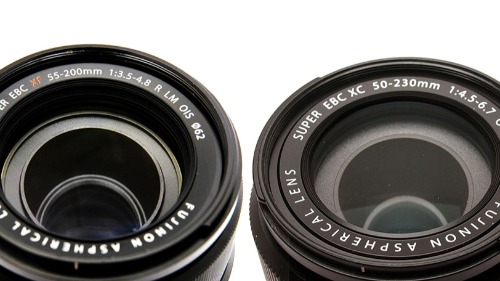Fujifilm XF 55-200mm VS XC 50-230mm - Telephoto Battle!

Fujifilm XF 55-200mm VS XC 50-230mm Telephoto Lens
A full review of the two budget Fujifilm Best Telephoto Lens from Fujifilm the XF 55-200mm compared to the XC 50-230mm. Today we'll review the sharpness, rendition, contrast and overall usability of these two lenses. Therefore, we'll determine what suits your photography requirements from a price vs image quality perspective.
Fujinon XF 55-200mm F/3.5-4.8 R LM OIS
The XF 50-200mm, my current go-to lens and my beloved telephoto lens, but why? As a full-time landscape photographer, I love the idea of having a tri lens setup (Learn about Tri Lenses here). The XF 55-200mm fits my photography needs due to size, weight and image quality.
Fujinon XF 55-200mm essential facts:
- 55-200mm Focal Length (Equiv 84-305mm in 35mm format)
- F3.5-4.8 Maximum Aperture & F/22 Minimum Aperture
- 75.0 mm diameter x 118 (177 mm fully extended at 200mm)
- Weight 580g (20.5 oz)
- "Up to" 4.5 stops of Image Stabilisation
- 62mm filter thread
- 14 elements in 10 groups
- 7 rounded blades
- Autofocus & Image Stabilised
- Price €699.00

Image Stabilisation
The image stabilisation from the XF 55-200mm is remarkable, especially with the F3.5 aperture - an advantage over the XC 50-230. Therefore, handheld images from the XF lens paired with X-T3 have been sharp at 1/8 at 200mm. They are pairing with the XH-1 for video purposes - nothing but near-perfect handheld results.
Fujinon XF Autofocus & Sharpness
Autofocus through this lens in both video and image is mere on perfect being silent, reliable and consistently accurate through the whole focal range.
Lastly, sharpness is second to none throughout the entire focal range of this lens. The XF wins in sharpness in the photo below, especially from F/5.6 to F/11, where landscape photography is most commonly shot.
Build Quality
In comparison, the bigger brother of the XF 50-140mm is streets ahead to build quality. Besides, the added weight and glass isn't a sufficient enough upgrade for me to carry the extra weight and price tag. Compared to cheap, cheesy plastic APS-C lenses, they are made primarily out of anodised aluminium. This is the second-best telephoto lens from any APS-C manufacture behind the XF 50-140.
In conclusion, this lens offers an excellent balance of price to quality standpoint. A lens provides OIS and Aperture switches, with two minor downfalls not displaying focus or aperture markings on the outer casing itself.
Fujinon XC 50-230mm F/4.5-6.7 OIS II
The Fujifilm XC 50-230mm a budget lens from Fujifilm offers excellent optics and sharpness compared to "pro" XF lenses. Besides, this lens provides sharp images at an affordable price. The lens's outer casing is lightweight, made from plastic but most importantly, the glass is glass - on paper; it seems too good to be true.
Fujinon XC 50-230mm essential facts:
- 50-230mm Focal Length (Equiv 76-350mm in 35mm format)
- F/4.5-6.7 Maximum Aperture & F/22 Minimum Aperture
- 69.5 mm diameter x 111 (177 mm fully extended at 200mm)
- Weight 375g (13.22 oz)
- "Up to" 3.5 stops of Image Stabilisation (OIS II Version)
- 58mm filter thread
- 13 elements in 10 groups
- 7 rounded blades
- Autofocus & Image Stabilised
- Price €366.59

Image Stabilisation
Firstly, the image stabilisation from the XC 50-230mm seems excellent regarding the more significant minimum aperture and exceptional price tag. Secondly, handheld images from the XC lens paired with X-T3 must be bumped up to 1/50 at 230mm to produce sharp images. Therefore, pairing it with the XH-1 for video purposes yielded pleasing results.
Fujinon XC Autofocus & Sharpness
Autofocus through this lens seems to hunt significantly, notably when comparing it to a bigger brother. The 50-230mm measured the inconsistent focus in visible daylight and a low contrast area.
Additionally, bright daylight and a low contrast area measured the inconsistent focus. Therefore, not an excellent result for video users, but if manual focus is your forte for photography and videography use - this will be no issue!
In conclusion, sharpness is passable throughout the entire focal range of this lens. Being directly compared to the XF series shows significant flaws - even between F/5.6 and F/11.
Build Quality
A complete lens made entirely from plastic, resulting in a lightweight and inexpensive lens. The downfall is no aperture ring, no OIS switch, no aperture switch, and F/4.5-6.7 aperture. As a result, this allows the lens to perform optically at one of the most inexpensive Fujifilm lenses on the market.
XF 55-200mm VS XC 50-230 Comparison
XF VS XC Essential Comparison:
- Price (XF €699.00 VS XC €366.59 - July 2019)
- Metal VS Plastic build quality.
- XF F/3.5-4.7 VS XC F/4.5-6.7
- 55-200mm VS 50-230mm Focal Range
- OIS external switch VS OIS In-Camera switch
- Aperture switch VS None
- Aperture Ring VS Button Control on Camera
- 14/10 VS 13/10 (Elements/Groups)
Fujifilm Best Telephoto Lens?
In conclusion, comparing Fujifilm Best Telephoto Lens directly, the XF 55-200mm is a clear winner. But, saying this, you don't always need the best of the best. The question you need to answer is
"How often do you shoot telephoto photography?"
If often, yes, I 100% agree the XF is best for you, but the XC is the right lens for those who wish to dapple in "some" telephoto images.
Therefore, Fujifilm Best Telephoto Lens's conclusion is: It's better to have a telephoto lens in your bag because you never know what nature will deliver. Capturing the images is 100x more important than the sharpness of a lens.